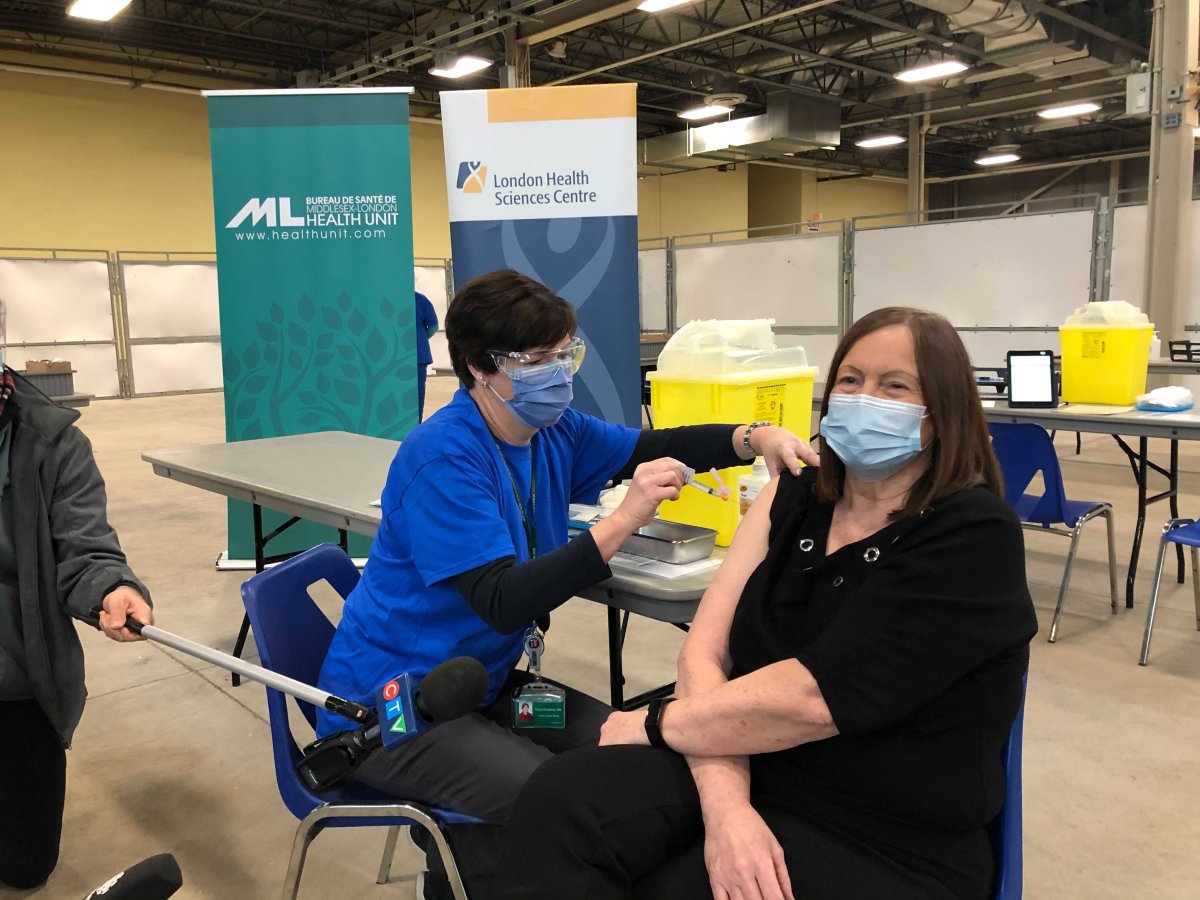The London Health Sciences Centre is “looking to get up to 1,000 vaccinations per day in the near future” and is announcing an expansion in access to coronavirus vaccines.

According to LHSC’s chief medical officer Dr. Adam Dukelow, the vaccination program started with about 150 vaccinations each of the first two days before quickly doubling to 300 daily vaccinations over the previous week, and is planning to reach 500 daily vaccinations this week.
“We are confident we will meet our target of 500 vaccinations per day,” he said, adding that eight more vaccination stations are being added to the Western Fair Agriplex vaccine clinics to bring the total up to 20 stations.
“(We) are looking to get up to 1,000 vaccinations per day in the near future.”
By the end of the day on Monday, roughly 2,700 health-care workers in the region will have been vaccinated since Dec. 23, 2020.
LHSC chief operating officer Neil Johnson told Global News progress is “steady,” though he admits “it’s slower than anyone would like.”
Experts have raised alarm over the rollout of coronavirus vaccines across Canada.
As of Sunday, over 420,000 doses of Moderna and Pfizer’s coronavirus vaccines had been delivered to the provinces but just 119,202 vaccines had been administrated, according to COVID-19 Tracker Canada. Based on that data, just 0.317 per cent of the population has received at least one dose of a COVID-19 vaccine and only 28.4 per cent of the available doses have been administered.
In the London, Ont., region, Dukelow says policy changes are widening the pool of who is able to be vaccinated, which will help boost local numbers.
Initial direction limited the number of staff at any long-term care facility receiving the vaccine as a precaution in order to ensure that any side effects did not impact staffing levels or patient care, but long-term care facilities have now been told to “send as many health care workers as can be vaccinated.”

In addition to that directive, Dukelow says more health-care workers in hospitals will soon be eligible to receive the vaccine.
“While long-term care staff remain the priority for receiving the vaccine, we are pleased to be expanding the eligibility, making the vaccination program available to staff and physicians in emergency departments, critical care units and units that care for COVID-19 patients from all hospitals within Huron, Perth, Oxford, Middlesex and Elgin counties,” he said Monday.
Both the Pfizer-BioNTech and Moderna vaccines require two doses and Dukelow says the current approach is to plan to give a second dose to everyone that receives the first dose “to ensure as much immunity as possible” rather than “just giving one dose and getting as many people the vaccine as possible.”
It’s not enough to have needles and arms, however.
Johnson says “we’re really blessed in the London-Middlesex area with a lot of family doctors, general practitioners” volunteering their time, as well as LHSC staff and Middlesex-London Health Unit staff, but much of the need is “on the administrative side.”
“We need registration clerks, booking clerks — the scheduling, as I’ve said — and we’re taking steps to build those staff,” said Johnson.
“We’ve hired a number of staff to actually do that work as well, too.”
Johnson, Dukelow and MLHU medical officer of health Dr. Chris Mackie all mentioned the incoming Moderna vaccine as a more flexible option.
“The Pfizer vaccine’s pretty tricky,” Johnson said, noting its extreme “cold-chain,” or temperature-controlled supply chain, requirements, “but the Moderna vaccine will hopefully be a game-changer.”
Mackie said doses of the Moderna vaccine have not yet arrived but “we’re told to expect it very soon.”
“Moderna vaccine is a little bit more flexible from a cold-chain perspective. So we will be taking it to long-term care and retirement homes to deliver to the residents of those homes.”
Dukelow says the region is in the first of three phases of the vaccination rollout, with the first phase involving “a very directed approach to the small amount of vaccine that we have.” While the interim goal is a vaccination rate of 1,000 per day, the long-term goal is “as high as possible.”
“Even as Moderna is rolled out, that will allow us to expand where we’re vaccinating, as Dr. Mackie mentioned earlier, getting into long-term care homes and vaccinating the residents. When we get into Phase 2 and ultimately Phase 3, the rate is absolutely as high as possible, as much vaccine as we can get and as many people as possible will take it.”

At a media briefing on Monday afternoon, Dukelow also commented on suggestions that doses had already gone to some people who are not involved in direct patient care.
“We have a list of people that should be eligible to receive the vaccine and our phone operators do their best to check that list when appointments are booked. Admittedly, as we ramped up, especially in the early days, there were people that wouldn’t necessarily have been on the priority list that slipped through the cracks from various types of providers and agencies,” he said.
“That has been tightened up.”
Dukelow suggested as well that some leaders, for example, who will be receiving the vaccine are actually involved in patient care.
“So there may be more to the stories that you’re hearing, but we are doing our very best to ensure that we get the needles in the right people’s arms while also trying to get them in as many arms as possible.”
Johnson also commented on ironing out wrinkles in initial systems and processes, telling Global News that the call centre, “which is only available to those long-term care homes and other staff who have been prioritized, first couple of days had about 20,000 calls.”
“So we had some things to work out with our call centre and smooth that out a little bit.”
The province is expected to provide more details in the coming weeks as to the order and timeframe in which specific population groups will be eligible to be vaccinated.
Dr. Dirk Huyer, a member of the province’s COVID-19 vaccine distribution task force, said last week that the task force is working to determine the sequencing “over the next number of weeks,” after which it should be publicly released.

— with files from Global News’ Katie Dangerfield and The Canadian Press’s Paola Loriggio.









Comments